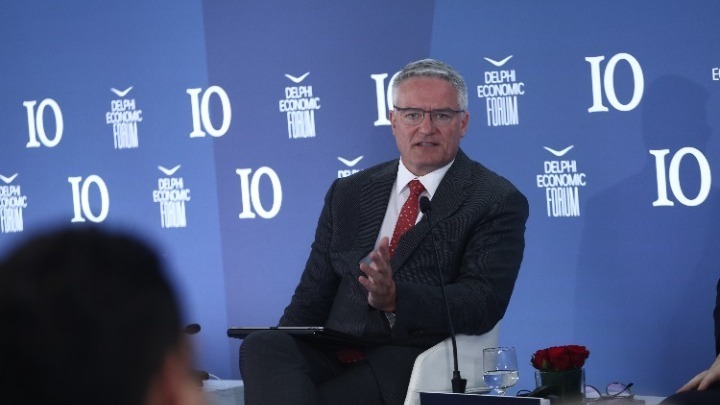DEF X-Mathias Cormann to ANA-MPA: Greek economy will continue to show economic growth higher than the eurozone average

The Greek economy will continue to show economic growth higher than the eurozone average, Mathias Cormann, Secretary-General of the Organization for Economic Cooperation and Development (OECD) said to the Athens-Macedonian News Agency (ANA-MPA), in an interview he gave in the context of the Delphi Economic Forum X. At the same time, he praised Greece for its reduction in public debt
In particular, the OECD will proceed with a downward revision of its forecasts for global economic growth, as a result of the imposition of tariffs by the US, Cormann noted.
"Our next economic outlook will be released in early June together with our Ministerial Council meeting in Paris, but all other things being equal and if there is no change in the other direction, again, between now and then we would say that this will lead to lower growth, higher cost, lower growth and indeed will not be a positive development for the global economy. What we are saying to everyone is that there are better ways to tackle unfair trade practices, issues with the global level playing field and to boost economic security, supply chain resilience and really countries should proactively with the solutions focused, engage with each other bilaterally and multilaterally, including through organizations like the OECD to find the best possible ways forward that do not involve tariffs and keeping markets open and maintain the benefits of rules based international trade," he said and added:
"This is our message to all governments. Our message to all governments is that to the extent that you see issues and problems with the way global markets are functioning, to the extent that you see issues that need to be addressed when it comes to the global rules based trading system, talk to each other bilaterally and multilaterally, including through organizations like the OECD on how to tackle these issues in a way that is constructive and solutions focused and achieves mutually beneficial outcomes and also a more beneficial outcome for the global economy. The unilateral application of widespread tariffs on countries around the world will lead to lower growth. It will lead to higher costs, including higher costs and lower growth over time for people in the United States."
At the same time, Cormann praised Greece for its efforts to reduce public debt, noting that "Greece has done a very good job in recent years in bringing down its debt as a share of GDP. I mean, really, Greece is one of the countries that has continued to track in the right direction when it comes to bring down a very high level of debt as a shared GDP. It's still high, but it's very much trending in the direction now. Now, all other things being equal again, to the extent that tariffs are driving lower growth, that means less income for governments and that means that the fiscal situation becomes more challenging and to the extent that higher tariffs and tariffs more generally drive up inflation, it means that central banks will have to increase interest rates in order to tackle inflation and that will increase the cost of servicing debt and so when it comes to debt sustainability of course, this is, you know, not very positive developments."
He added: The Greek economy has been performing very well in recent years, I mean the unemployment rate has come down to its lowest level since November 2008, it's certainly come down very sharply from its peaks and we do project Greek growth to be above the Eurozone average but this current development, Greece is an open trading economy and to the extent that current developments are impacting on the growth of trading partners in particular across Europe for Greece, this of course is also a challenging context for Greece."

